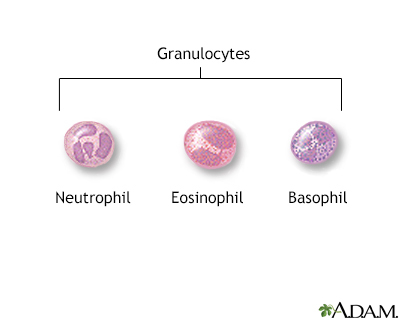Weighty Choices: Selecting Optimal G-CSF Doses for Stem Cell Mobilization to Optimize Yield
Nosha Farhadfar, MD, and colleagues at University of Florida Health Cancer Center led a study conducted by an international team of researchers using data…

Update your location to show providers, locations, and services closest to you.
Granulocytes are a type of white blood cell that has small granules. These granules contain proteins. The specific types of granulocytes are neutrophils, eosinophils, and basophils.
Granulocytes, specifically neutrophils, help the body fight bacterial infections. The number of granulocytes in the body usually increases when there is a serious infection. People with a lower number of granulocytes are more likely to develop bad infections more often.
Granulocytes are counted as part of a white blood cell differential test.

Hall JE. Hall ME. Resistance of the body to infection: I. leukocytes, granulocytes, the monocyte-macrophage system, and inflammation. In: Hall JE, Hall ME, eds. Guyton and Hall Textbook of Medical Physiology. 14th ed. Philadelphia, PA: Elsevier; 2021:chap 34.
Nosha Farhadfar, MD, and colleagues at University of Florida Health Cancer Center led a study conducted by an international team of researchers using data…

September 29, 2015
Call it the scientist’s version of happy hour: A new, four-drug cocktail has shown a novel ability to reverse established Type 1 diabetes in some mice,…
Department of Pathology, Immunology, and Laboratory Medicine, Department of Pediatrics, +4 more